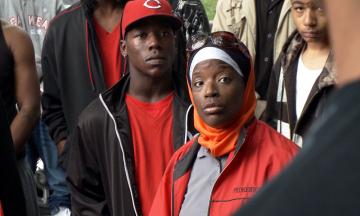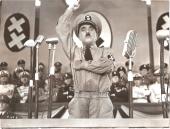Tuesday, July 30, 2024 - 12:28am
'The Interrupters' chronicles those trying to stem the tide of violence
Many years ago, a big booze-drenched summer party I attended went from just rowdy to seriously out-of-control. Two guys started swearing and fighting over a hysterical girl, who was egging them on. When beer bottles started flying and shattering, I made the executive decision to intervene. "Don't do it," said the co-host. "Somebody has to," I replied, heroically.
When I did, the combatants instantly refocused their rage on me. I remember ducking one bottle by an inch, as I beat a hasty retreat -- mission far from accomplished.
Movie? What movie?
Oh, yes. It's called "The Interrupters," and one of its lessons is that if you want to be a conflict-mediator, you had better know what you're doing.
Subtitled "a year in the life of a city grappling with violence," this powerful documentary concerns the war zone known as Chicago and its unenvied reputation for highest murder rate among adolescents. On one night of that year, nine were shot in the space of five hours. Some 12- and 13-year-olds walk around wearing bullet-proof vests.
The most infamous incident -- the one that briefly galvanized the need for a response -- was the videotaped murder of 16-year-old Derrion Albert, a quintessential example of gangbanger mentality: They don't know who or what they're fighting. It's just, "If you ain't with me, you're against me."
Director Steve James is familiar with this terrain, and you may be familiar with his. Mr. James' "Hoop Dreams" (1994) superbly documented two inner-city Chicago kids' dream of becoming basketball stars, following five years of their triumphs and tragedies from high school through college.
This time, he chronicles the inspirational initiative of "violence interrupters," a group of ex-convicts who are part of CeaseFire. With painful firsthand knowledge of the consequences of street violence, they don't lecture captive audiences in schools. They go out onto the streets and insert themselves to preclude it. The goal is to intervene in the "front end" of an argument before guns pulled from waistbands take it to a dead end. They're a savvy variant of 911-type responders, with no grandiose intent to dismantle gangs, just to save lives.
In the course of that, the interrupters display an amazing blend of friendly persuasion and iron will, and three of CeaseFire's best are profiled here. Most charismatic by far is beautiful Ameena Matthews, herself the daughter of one of Chicago's most notorious gangsters. Caught up in that world (and abused from age 9 to 15), she now spends her time getting fearlessly in young faces about avoiding the choice of violence, walking into the middle of a fray or speaking impromptu at one of the countless makeshift memorials, amid the teddy bears and pathetic farewell notes that inevitably crop up at crime scenes. ("I am next," reads one.)
Her fellow mediator, Cobe Williams -- much lower key but equally effective -- spent 12 years in jail for drug trafficking (and, at age 11, saw his own father killed with a baseball bat). We see him now listening, refereeing, calming down a wild guy named "Flamo," who's inches away from a shooting rampage. In the depressingly similar pathology of the situations, grievance always "justifies" violence. The trick is to literally interrupt the progression.
Ameena is a Mother Teresa. Cobe, a St. Francis. "Interrupters" is patiently constructed around them and a small enough number of compelling cases, so that we truly get to know the protagonists, families and textures of the lives involved. Their dramas and destinies are as engrossing as any fictional characters'. Happy endings are at a premium -- but they happen.
This is Steve James' sixth feature-length collaboration with nonprofit Chicago production studio Kartemquin Films. At 125 minutes, it has his trademark, rather exhausting length. ("Hoop Dreams" was 170 minutes!) But it's hard to think of a more important subject in the cities. Young people in many of those neighborhoods fully expect to die violently. A funeral director interviewed in the film says 90 percent of his business consists of young gang members and their collateral casualties -- some killed for a $5 bag of marijuana.
"Youth violence is not a Chicago problem, it's an American problem," says Attorney General Eric Holder, re: the 2009 beating death of Derrion Albert in Chicago. Pittsburgh, for instance, has plenty of its own. But there's nothing political about "The Interrupters" -- no mention of NRA responsibility for gun proliferation, for instance, or of the insane "code of silence" among inner-city victims and witnesses who refuse to inform on perpetrators.
Anybody who thinks "community organizer" work in general -- conflict-mediation like this, in particular -- isn't a real job should interrupt his ignorance and see this film.
Vote:






